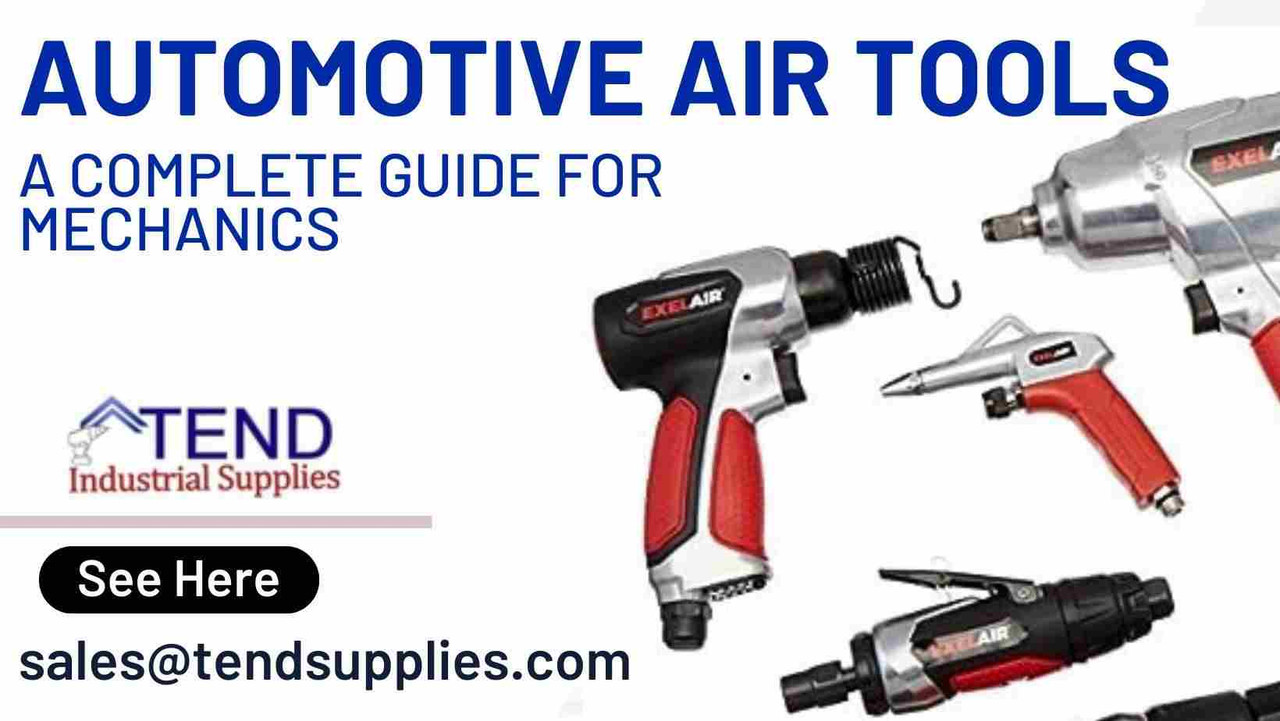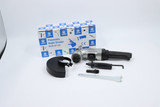Automotive Air Tools: A Complete Guide for Mechanics
Automotive Air Tools: A Complete Guide for Mechanics
Regarding efficiency and power in automotive repair, air tools have proven indispensable companions for mechanics. In this comprehensive guide, brought to you by Tend Industrial Supplies, we delve into the world of
automotive air tools, answering common questions and providing insights to help you make informed decisions.
What Are Automotive Air Tools? Automotive air tools
, or pneumatic tools, are devices powered by compressed air that mechanics use to perform various vehicle repair and maintenance tasks. These tools harness the power of air pressure to provide consistent torque and speed, enhancing productivity and precision.
The Best Pneumatic Tool Brand for Mechanics: Detailed content on the best air tools brand is available here. However, Shinano Pneumatics of Japan, Apex Tool Group tools are known for their durability, dependability, and versatility. The Dotco, Cleco, and Apex brands are premier lines in the pneumatic tools category. One of the most trusted brands in automotive air tools is [Brand Name]. Known for their durability, performance, and wide range of offerings, [Brand Name] tools have gained the favor of mechanics worldwide.
Three Basic Types of Pneumatic Tools:
- Impact Tools: Including impact wrenches and drivers for high-torque tasks.
- Cutting Tools: Pneumatic grinders and saws for cutting metal and other materials.
- Fastening Tools: Like pneumatic drills and screwdrivers for efficient assembly and disassembly.
Choosing the Right Air Compressor Size for Automotive Tools: Selecting the appropriate air compressor size depends on the tools you intend to use. A compressor with a [recommended size] gallon tank capacity and [recommended CFM] cubic feet per minute output is ideal for most automotive tasks.
Ideal PSI for Pneumatic Tools
: The best PSI for pneumatic tools typically ranges from [recommended PSI range], providing the optimal balance between power and efficiency.
Running an Impact Wrench: To run an impact wrench effectively. As a simple rule of thumb, the airflow from the air compressor must be at least 3/2 times the minimum requirement of the impact wrench. For example, a 1/2″ drive Impact wrench usually requires about 5 CFM airflow at 90 psi. So, the airflow rating of the air compressor at 90 psi should be 3/2 * 5 = 7.5 CFM.
Are Air Tools Worth It?
Air tools offer a range of benefits, including higher torque, lightweight design, and reduced maintenance compared to traditional tools. Their cost-effectiveness and enhanced productivity make them a valuable investment.
Understanding CFM in Air Tools
CFM stands for cubic feet per minute and indicates the volume of air a compressor can deliver. Higher CFM ratings benefit tools requiring more air, such as impact wrenches and sanders.
Why Automotive Shops Prefer Air Tools?
Auto shops utilize air tools for their consistent power delivery, speed, and torque, ensuring efficient completion of tasks. They contribute to increased productivity, reduced fatigue, and enhanced precision in various automotive repairs. In the dynamic world of automotive repair, efficiency, precision, and productivity reign supreme. Air tools have earned prominence in automotive shops among the many tools available to mechanics. This article explores why air tools are preferred for automotive professionals seeking optimal performance and outstanding results. We have also prepared a guide for automotive air tools here
1. Consistent Power Delivery: Air tools thrive on a steady supply of compressed air, ensuring consistent power output. This reliability is crucial for achieving uniform torque and speed, guaranteeing precise and efficient repair work.
2. Speed and Torque: Automotive tasks often require quick execution and controlled force. Air tools, such as impact wrenches, provide high torque and rapid rotation, enabling mechanics to tackle challenging nuts, bolts, and fasteners effortlessly.
3. Reduced Fatigue: Air tools are lightweight and ergonomically designed, minimizing the strain on mechanics during extended use. Reduced vibration and comfortable grips reduce fatigue, allowing technicians to focus on precision and quality.
4. Versatility: The versatility of air tools is a major advantage. Whether it's changing tires, tightening screws, or cutting metal, air tools cover a wide spectrum of automotive tasks, streamlining operations and reducing the need for multiple tool types.
5. Enhanced Precision: Air tools offer superior control over power delivery, allowing mechanics to adjust the force with precision. This level of control ensures that delicate tasks are executed with finesse, minimizing the risk of damage.
6. Reduced Maintenance: Compared to some electric tools, air tools have fewer intricate parts, resulting in reduced wear and tear. This translates to less frequent maintenance and lower maintenance costs over time.
7. Cost-Effectiveness: Air tools are often more cost-effective than electric ones. Their durability, longevity, and lower maintenance requirements contribute to a favorable cost-to-benefit ratio for automotive shops.
8. Safer Working Environment: Air tools produce less heat than electric tools, reducing the risk of burns or fire hazards. Additionally, they emit fewer sparks, fumes, and electromagnetic fields, enhancing overall workshop safety. 9. Quick Operation: Air tools offer rapid acceleration and deceleration, minimizing downtime between tasks. This speed increases productivity, allowing mechanics to accomplish more in less time.
10. Compatibility with Compressors: Since air tools rely on compressed air, they can be easily paired with various air compressors, offering flexibility and adaptability to different shop setups.
11. Longevity: Air tools have a longer lifespan than electric tools due to their simplified design and reduced wear during operation. This longevity translates to an enhanced return on investment.
12. Noise Levels: Air tools are generally quieter than their electric counterparts, creating a less disruptive working environment and reducing noise-related stress for mechanics.
The preference for air tools in automotive shops is rooted in their unwavering performance, versatility, and efficiency. These tools contribute to high-quality repairs, streamline operations, reduce fatigue, and ensure a safe and productive workshop environment. Air tools remain a cornerstone of excellence for professionals dedicated to achieving outstanding results as automotive repair evolves. Navigating automotive air tools is crucial for mechanics aiming to achieve efficiency and precision in their work. Tend Industrial Supplies provides top-tier air tools and equipment, ensuring your toolbox is well-equipped for any automotive challenge.









